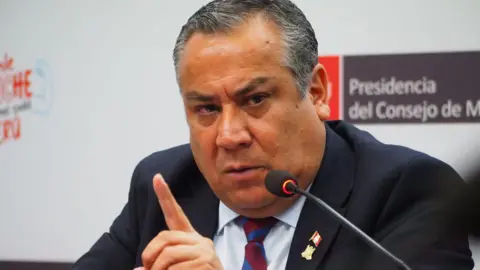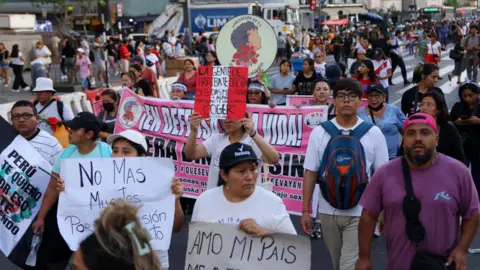ARTICLE AD BOX
Vanessa Buschschluter
BBC News

 Carlos Garcia Granthon/Fotoholica Press/LightRocket via Getty Images
Carlos Garcia Granthon/Fotoholica Press/LightRocket via Getty Images
The prime minister of Peru, Gustavo Adrianzén, has resigned hours before he was due to face a no-confidence vote in Congress.
Members of Peru's Congress had called for the no-confidence vote after the recent kidnap and killing of 13 mine workers, which shocked the country.
Adrianzén's resignation is another blow to the embattled president, Dina Boluarte, who has seen her approval ratings plummet as crime rates in the country have soared.
The resignation of the prime minister - the third to serve under Boluarte - forces the president to replace her entire cabinet, adding to Peru's political upheaval.
Under Peru's constitution, all ministers have to step down if the prime minister quits.
While the president can rename the same people to the posts they resigned from, she can only do so once a new prime minister is in place.
The collapse of the cabinet comes at an already rocky time in Peruvian politics.
Shortly before Prime Minister Adrianzén announced his resignation, Boluarte had reshuffled her existing cabinet, announcing new ministers of finance, interior, and transport.
All three will now have to step down, just hours after being sworn in by the president.
The already low approval rating of President Boluarte - who was sworn in when the previous president, Pedro Castillo, was impeached - have fallen further as Peruvians grow increasingly impatient at what they say is her failure to tackle crime.
In recent months, hundreds of people have taken to the streets in protest at the growing problem of extortion, as gangs increasingly demand payments even from the smallest businesses, including transport workers.
Dressed in white, they demanded "an immediate answer to combat extortion and targeted killings".

 CONNIE FRANCE/AFP via Getty Images
CONNIE FRANCE/AFP via Getty Images
People held up placards reading "no more deaths" at a protest rally in Lima in March

 3 months ago
90
3 months ago
90








 English (US) ·
English (US) ·